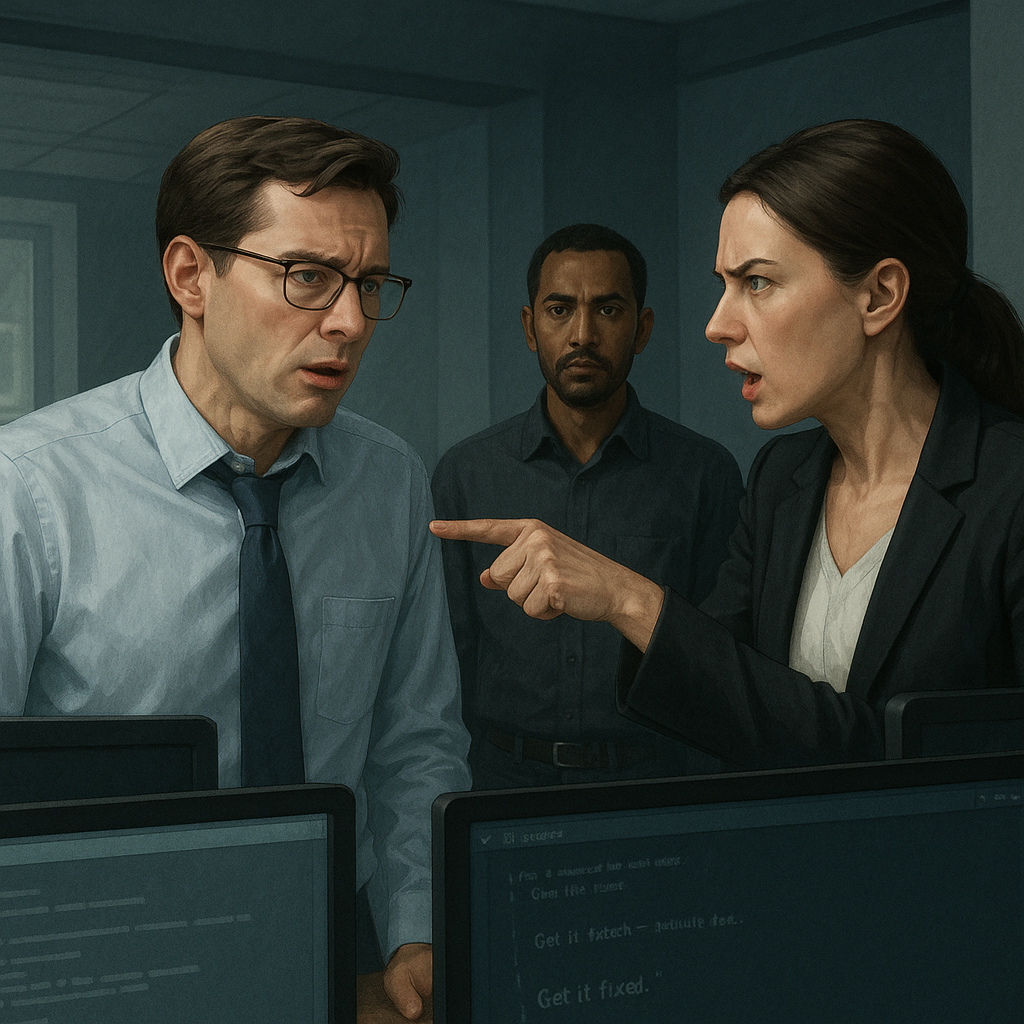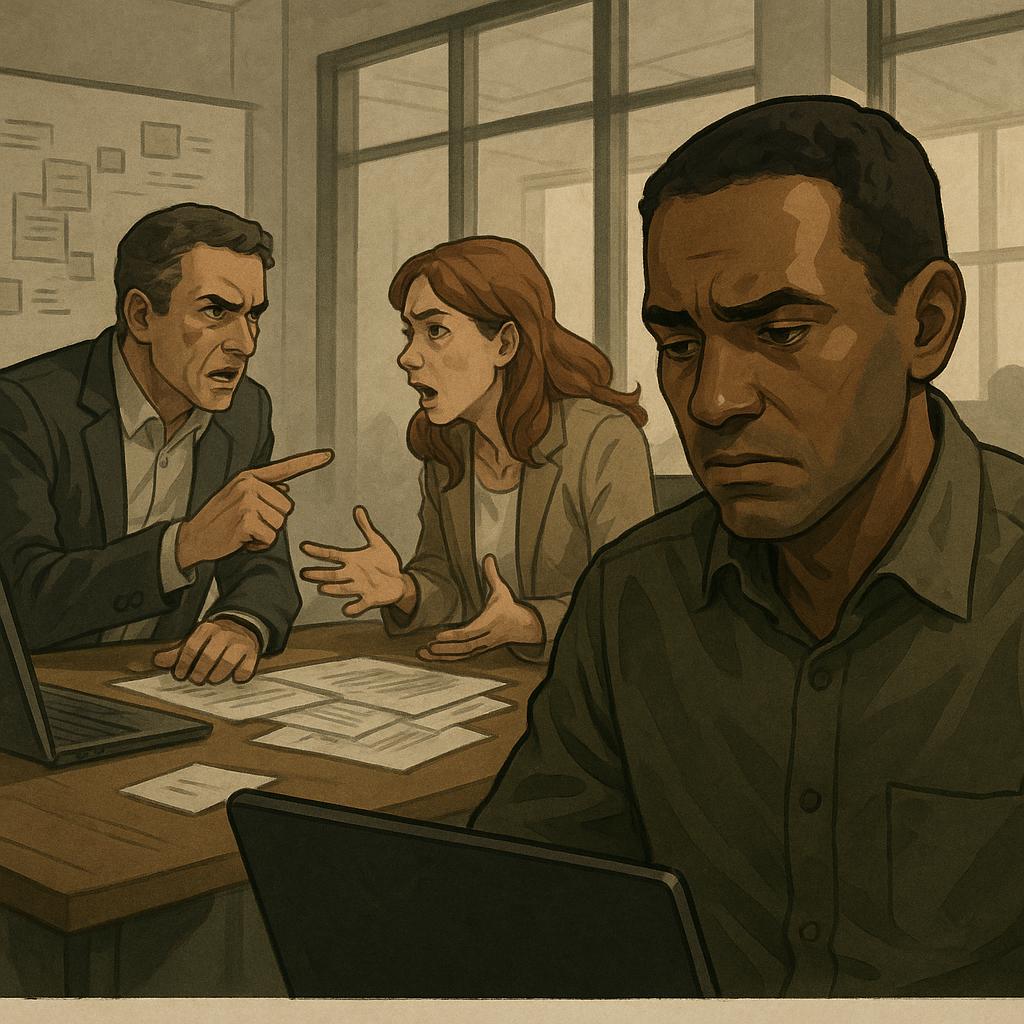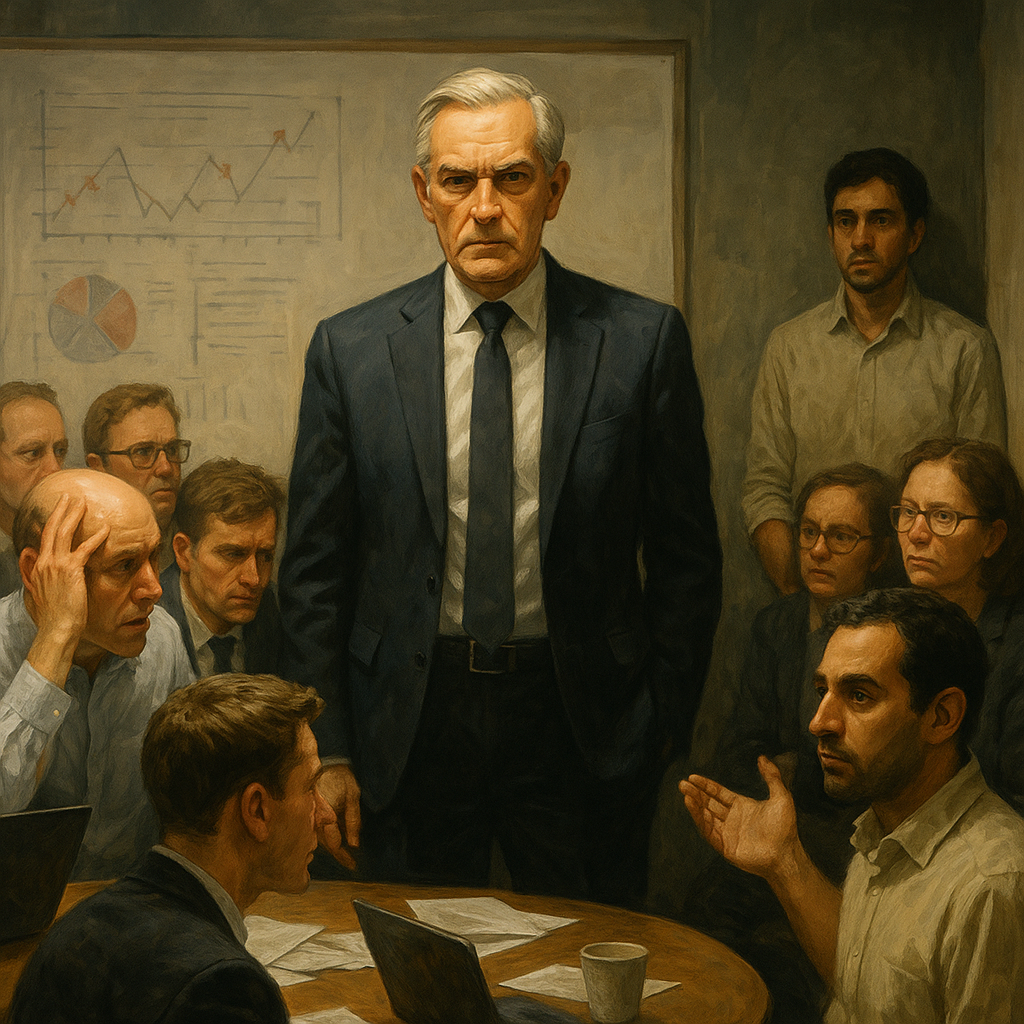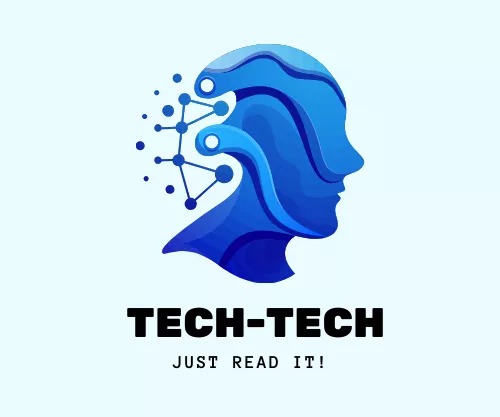Wednesday — 9:42 AM
Incident Room, IT Floor
Banque Verdienne, Paris HQ
The war room of Banque Verdienne was colder than usual. The sterile hum of technology couldn’t drown out the tension that pulsed through the air, filling the room with an undeniable weight. The bank’s prized Private Banking app had just launched, and it was supposed to be the shining example of the IT department’s newfound agility and strength. But now, clients from Geneva, London, and New York were all reporting errors. Access to their portfolios was cut off, and transactions were delayed or completely lost in the system.
Phones rang incessantly. The sharp sound of frantic keystrokes echoed across the room as everyone scrambled to fix the disaster. The Business leaders were on edge, particularly Joséphine Charron, the BV of Private Banking, whose face was growing steadily redder as the minutes passed.
“This is unacceptable, Gabriel,” she snapped, her voice tight with frustration. She shot a pointed look at Gabriel Garnier, the Head of Development, who stood at the front of the room with his arms folded and a furrowed brow. “We can’t afford another failure like this!“

Gabriel, calm but with the telltale signs of tension creeping into his voice, tried to maintain his composure. “It’s not a simple fix, Joséphine. The system wasn’t built to handle this level of traffic. We didn’t test it for the volume we’re seeing now.”
“I don’t want excuses!” she interrupted, waving him off. “Get it fixed!”
Across the room, Slim Benali stood quietly in the corner, a silent observer of the chaos unfolding. As a developer from the Tunis-based SwDF, he had seen these kinds of breakdowns before. But here, in the heart of the Paris headquarters, the stakes were much higher. This wasn’t just another bug or deployment failure; this was a failure of the system itself—a system that had been broken for far too long.

Slim knew this wasn’t just a technical problem. The real issue lay deeper, within the very fabric of the IT department. There was no communication, no collaboration, and a severe lack of trust between the Paris and Tunis teams. Business and IT were at odds, and as the pressure mounted, it became clear that the cultural divide would be the biggest obstacle to any meaningful change.
As Gabriel Garnier and Joséphine Charron continued their back-and-forth, blaming each other and pointing fingers, Slim couldn’t help but notice how quickly the room had descended into chaos. Gabriel’s usual calm authoritarian demeanor had faltered. He was trying to control a situation that was quickly spiraling out of control, but he couldn’t. And Joséphine—frantic and anxious—wasn’t helping. Her repeated demands for quick fixes only added to the chaos.
Slim felt a weight settle in his chest. This wasn’t just about fixing an app. This was about fixing a broken culture.
As the tensions reached a breaking point, Pierre Olivier, the Managing Director of the bank, entered the room. His presence immediately silenced the chaos. A man who was both revered and feared, Pierre carried the weight of the bank’s reputation on his shoulders. He was its spiritual father, the man who had built the bank’s prestige and kept it afloat during tough times.

Pierre surveyed the room, his gaze sweeping over the frantic faces of his IT leaders. Then, his eyes landed on Slim—the quiet Tunisian developer, standing in the corner, trying his best to remain invisible. Pierre had seen him in meetings before but hadn’t really taken the time to notice. Today, however, was different.
The tension in the room didn’t faze Pierre. He had seen chaos before. But what he saw in Slim Benali’s eyes caught his attention. Slim was not flustered. He wasn’t panicking. He was watching, observing, processing the entire situation with a calm detachment that others in the room couldn’t manage. It wasn’t just the app failure that interested Pierre; it was the culture that had led to this failure.
Pierre took a moment before addressing the room. His voice was low, but there was a quiet authority in it. “This isn’t just about the app. This is about something deeper. We can’t continue running IT the way we’ve been doing. We need change.”
Slim’s attention sharpened. Pierre’s words resonated with him on a deeper level. He had already seen the fractures in the IT department—the way the Paris teams looked down on the nearshore teams, the way miscommunication and misalignment held them back from delivering results. It wasn’t just a technical failure—it was an organizational failure.
Pierre turned to Bruno Châtelain, the Head of Innovation, and Gaspard Thibault, the CIO. “We need to start the transformation now. I want a plan in place by the end of the week. I don’t care if we have to pull resources from across departments. This is our priority.”
It was clear to Slim that this was the beginning of something monumental. The IT department at Banque Verdienne was at a crossroads, and Galite, the transformation project that would unify, simplify, and amplify the department, was going to be its lifeline.
But Slim knew that changing the culture was going to take more than a few tweaks to processes. It would require a fundamental shift in how people worked together, communicated, and trusted each other. And that was no small task.
The Catalyst for Change
The next day, Pierre Olivier quietly asked Slim Benali to meet with him. Over coffee, Pierre looked at Slim with an expression that was both contemplative and appreciative. “I’ve been watching you, Slim.” Pierre’s voice was calm but carried the weight of an unspoken understanding. “You’re not just a developer, are you?”
Slim hesitated before replying, not entirely sure what Pierre meant. “I’m just here to do my job. To help where I can.”
Pierre smiled, a knowing smile. “I’ve seen your quiet leadership. That’s what we need in this transformation—people who can see the bigger picture and help guide us through the changes. You’ll be instrumental in this.”
Slim looked up, meeting Pierre’s eyes. This was his moment.
Pierre leaned in slightly. “You’ve got a big task ahead of you. The transformation will be hard, but it’s necessary. I’m going to have you take on a key role. Observe, but also act. We need people like you to bridge the gaps, especially between Paris and Tunis.”For the first time since joining the bank, Slim felt a sense of purpose. He wasn’t just in the background anymore. Pierre had trusted him, and with that trust came a responsibility he wasn’t sure he was ready for—but he would rise to the occasion.


